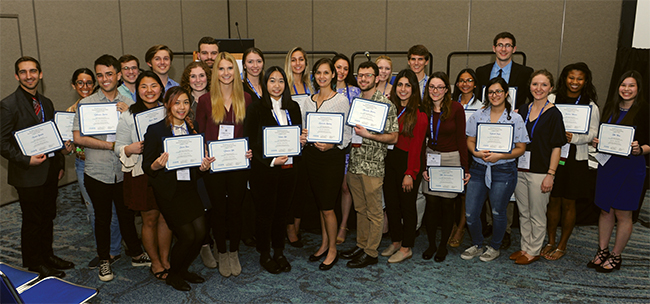2018 honor society inductees
The American Society for Biochemistry and Molecular Biology Honor Society (Chi Omega Lambda) recognizes exceptional undergraduate juniors and seniors pursuing degrees in the molecular life sciences at colleges or universities with ASBMB Student Chapters. Students are recognized for their scholarly achievement, research accomplishments and outreach activities. Information on nominating a student for the honor society is located on the Education/Student Chapters webpage.
 American Society for Biochemistry and Molecular Biology Honor Society inductees pose for a group photo in April during the 2018 annual meeting in San Diego.ASBMB Photo
American Society for Biochemistry and Molecular Biology Honor Society inductees pose for a group photo in April during the 2018 annual meeting in San Diego.ASBMB Photo
| Benjamin Anderson, Purdue University Will Barr, Wesleyan University Shannyn Bird, University of Nebraska–Lincoln Emily Bliss, Otterbein University Kyle Boulanger, Grandview University Kelly Budge, Goucher College Michael Chen, University of Massachusetts Amherst Stephanie Choi, University of Massachusetts Amherst Jacob Crosser, Purdue University Jocelyn Daubendiek, University of Nebraska–Lincoln Lauren DeLong, Salisbury University Amanda Duplan, Grandview University Grace Ferri, Boston University Corey Gallen, Saint Leo University Nina Marie Garcia, University of San Diego Kate Harris, Purdue University Victoria Henderson, Trinity University Megan Horita, Saint Louis University Evan Huggins, Otterbein University Thomas Hynes, Rochester Institute of Technology Aria Jordan, University of Massachusetts Amherst Thomas Kania, University of Massachusetts Amherst Emily Kessler, Wesleyan University Sophia Kisling, University of Nebraska–Lincoln Auston Larratta, Saint Leo University Cindy Le, University of Massachusetts Amherst Christine Little, Wesleyan University |
Sonoor Majid, University of Nebraska–Lincoln Victoria Mak, Saint Louis University Antoinette Martinez, University of St. Thomas Julie McDonald, Wesleyan University Rachel Nguyen, Otterbein University Rubye Peyser, Wesleyan University Shivani Phadke, Rochester Institute of Technology Camille Potts, Trinity University Alexander Shames, Wesleyan University Anna Sharabura, Hendrix College Flowreen Shikwana, University of San Diego Halie Sonnenschein, University of San Diego Coleman Spence, Marymount Manhattan College Alexa Strauss, Wesleyan University Joelle Strom, University of South Carolina Jonathan Tadros, Stockton University Danyal Tahseen, Trinity University Tracy Tauro, Marymount Manhattan College Reyhaneh Tirgar, University of St. Thomas Sydney Townsend, University of Nebraska–Lincoln Sirena Tran, University of San Diego Jasmine Warren, Saint Leo University Derek Wei, Otterbein University Kathleen Wendover, Hendrix College Kellie Wong, Minnesota State University, Mankato |
Enjoy reading ASBMB Today?
Become a member to receive the print edition four times a year and the digital edition monthly.
Learn moreGet the latest from ASBMB Today
Enter your email address, and we’ll send you a weekly email with recent articles, interviews and more.
Latest in People
People highlights or most popular articles

Embrace your neurodivergence and flourish in college
This guide offers practical advice on setting yourself up for success — learn how to leverage campus resources, work with professors and embrace your strengths.

Survival tools for a neurodivergent brain in academia
Working in academia is hard, and being neurodivergent makes it harder. Here are a few tools that may help, from a Ph.D. student with ADHD.

Quieting the static: Building inclusive STEM classrooms
Christin Monroe, an assistant professor of chemistry at Landmark College, offers practical tips to help educators make their classrooms more accessible to neurodivergent scientists.

Hidden strengths of an autistic scientist
Navigating the world of scientific research as an autistic scientist comes with unique challenges —microaggressions, communication hurdles and the constant pressure to conform to social norms, postbaccalaureate student Taylor Stolberg writes.

Richard Silverman to speak at ASBMB 2025
Richard Silverman and Melissa Moore are the featured speakers at the ASBMB annual meeting to be held April 12-15 in Chicago.

Women’s History Month: Educating and inspiring generations
Through early classroom experiences, undergraduate education and advanced research training, women leaders are shaping a more inclusive and supportive scientific community.
